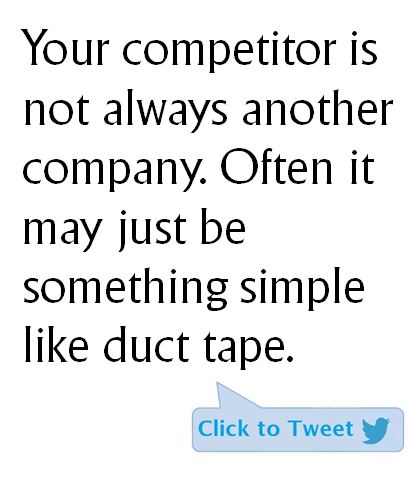by Matt Volpi
 Salespeople and product managers aren’t always the best of friends. A salesperson is driven by their individual goals and compensation. They are often too busy or uninterested to delve into the nuances of the solutions that product managers are carefully crafting and shepherding through the product development cycle.
Salespeople and product managers aren’t always the best of friends. A salesperson is driven by their individual goals and compensation. They are often too busy or uninterested to delve into the nuances of the solutions that product managers are carefully crafting and shepherding through the product development cycle.
But salespeople are an invaluable resource for product managers as they are having far more conversations with decision makers in the target market than a product manager could ever have. Despite their differences, product managers should be mining their salespeople for data while also taking those opportunities to ensure salespeople are utilizing the latest and greatest information and sales tools.
To help product managers make the most of their limited time with salespeople, here are six questions you should be asking them when discussing a specific sales call:
1) Who are you talking to?
While it might be interesting to know which targets your salespeople are focused on, it is just as important to know who within those organizations they are actually having conversations with. It may not be the “user” you had in mind, and if that’s the case there might be different features or selling points that may be more valuable that audience. If they are talking to “buyers”, that’s great, but then that’s an entirely different conversation altogether.
2) What is the problem they are trying to solve?
This is an opportunity to dig deeper into what challenges your potential customers are really interested in addressing. Depending on what you hear, it might unearth a new feature to explore or the chance to educate your sales team on how your product already does what this type of customer needs.
3) What other options are they considering to solve that problem?
As a follow up, it’s always good to know which alternative solutions prospects are considering. This can obviously highlight direct competition (both known and unknown), but it can also unearth interesting nuggets, such as the fact that a prospect is willing to just live with the problem or may look to solve it in a totally non-traditional way that you would have never thought of. Your competitor is not always another company. Often it may just be something simple like duct tape.
4) What part of the solution were they most interested in?
When a sales call is going well, the prospective buyer will inevitably focus in on one or two particular aspects of the solution that they are most interested in. This is a great chance to see which features are actually getting people excited and which ones might not deserve as much attention.
5) What didn’t they like about our solution?
No one wants to hear that the product that have created after months and years of research and specification is flawed, but there’s a lot of value in hearing the negative perceptions that prospects may have. These are the barriers standing between your solution sitting on a shelf and your happy customer using it and raving about it to others.
one wants to hear that the product that have created after months and years of research and specification is flawed, but there’s a lot of value in hearing the negative perceptions that prospects may have. These are the barriers standing between your solution sitting on a shelf and your happy customer using it and raving about it to others.
Sometimes you will hear the same thing over and over – whether it is “too expensive” or “too hard to integrate with XYZ” – while other times you will stumble across a completely new type of complaint. Either way, this is often valuable feedback, particularly when you can quantify it to use as justification for making a change.
6) Why haven’t they bought it yet?
Now, this question should not be framed as if you are accusing the salesperson of not being able to close a deal. Instead, it is an opportunity to be helpful while also gleaning more information. Some responses might be:
- “It’s too expensive” – Does your sales team have the ROI tools and justifications they need to effectively sell the value proposition, or is it possible that your product IS too expensive?
- “They don’t have room in their budget until next year” – Should you be considering SaaS/rental models (or if you already have one, is the salesperson not pushing that for some reason)?
- “They are still not sure it will work for their particular needs” – Have they been given references or case studies from similar organizations?
- “They have not decided between us and a competitor” – Have you armed your sales team with a favorable comparison matrix, or is there something your competitor has that maybe you should be adding?
- “They need more people to approve it before moving forward” – Are there talking points and features that will help convince the next line of stakeholders that your solution is right for them?
Unless your sales organization is very small, you will not be able to ask these questions after every single sales call. Be judicious with your efforts and respectful of your sales team’s time while also asking these questions of different salespeople, particularly those that may be remote or not as pro-active in communicating what they are hearing in the field to those back at the home office.
Tweet this: Six Questions You Should Be Asking Your Salespeople http://wp.me/pXBON-45A #prodmgmt #sales
 Matt helps start-ups and established companies with product strategy, marketing execution and market research, with a focus on innovative solutions development and sales enablement. He has 20 years experience in product management and marketing at Internet and mobile tech companies. You can reach him at http://tovana.com or on Twitter as @mattvolpi
Matt helps start-ups and established companies with product strategy, marketing execution and market research, with a focus on innovative solutions development and sales enablement. He has 20 years experience in product management and marketing at Internet and mobile tech companies. You can reach him at http://tovana.com or on Twitter as @mattvolpi